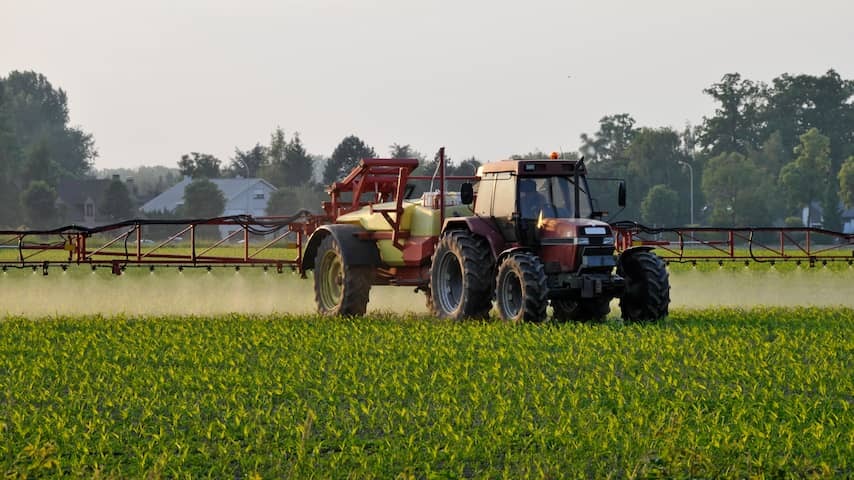
It is Becoming Increasingly Clear What Harmful Consequences Pesticides Have For Nature and Our Health. Parkinson’s Disease and Cancer are linked to it, and this year the Judge Prohibited its use in Two Places.
Pesticides Are Found Deep in Protected Nature Reserves. That was the conclusion of the butterfly foundation (The Butterfly Foundation) after its own research. It was just a list of Ten Natura 2000 areas and which pesticides were found there.
It was Therefore Only the Beginning of a Larger Study by the Vlinderstichting Into the Effects of Pesticides. But it was another sign that nature and pesticides are at odds with each other. And Public Health is also Increasingly Coming Into the Picture.
For example, pesticides are linked to diseases such as parkinson’s disease and cancer. “It is clear that recurring a certain amount of pesticides can caus Parkinson’s disease,” Says Teus van Laar, neurologist at the UMC Groningen. General Practitioners Who Work in Places Where a Lot Of Pesticides Are Used also See More Cases of Parkinson’s Disease, They Said in Several Media.
Parkinson’s Disease is a well-known disease Among French Winegrowers, and this summer Italian Researchers concluded that rats are more likely to get cancer if they receive more of the weed killer glyhosate. If Further Research Does Indeed Show that glyphosate can caus cancer, then its must be Banned Imediately, Stated the Dutch Federation of Agriculture and Horticulture (LTO).
But It is Difficult to Determine which amount makes the use of pesticides permissible, Says from Laar. “Every individual also reacts differently to it. Just like with smoking.”
“If you are very careful, you won use anything at all. It is about finding a balance,” Says Annemarie van Wezel. She is a professor of Environmental Quality and Health at Utrecht University.
Water Animals that from cocktails or agents
Van Wezel is also a member of the board for the authorization of plant protection products and biocides (CTGB). A whole mouthful, but in short the body that assesses which pesticides may be used in the Netherlands. Biocides are also included: For Example, Cleaning Products That Are Often Found in Kitchen Cabinets.
When Autorizing an Agent, The CTGB Looks at the Individual Pesticide. The college does not look at the total amount of agents present in The Environment. While it is precisely this mix of pesticides in, for example, the water that causes many plants and animals to die, as you can read in the story below.
“Those” cocktails “are certainly relevant,” Says van Wezel. “At CTGB we try to signal how legislation can be improved, but we are bound by current legislation.” In Other Words, if the law States That Certain Agents Are Permitted, The CTGB Cannot Determine That Those Agents Should Not Be Allowed On The Market.
It is also difficult that it is not always clear which mix of pesticides forms a toxic cocktail. “If only we knew,” Van Laar Sighs.
Judges Strict about the use of pesticides
AltheHeCertain Agents Have Been Approved, Closer Attention Must Be Paid to the Damage That Pesticides Cause, Two Judges Ruled in Recent Months. This Summer, The Judge Ruled That a Lily Grower in Limburg May not use pesticides for three years. Accordance to the Judge, it is not clear what the risk is of Parkinson’s Disease and Other Diseases.
In April, The Council of State (The Highest Administrative Court) Found that Lily Growers in Drenthe Should Have Applied For A Nature Permit For The Use of Pesticides.
If it is unclear what consequences pesticides have on nature, such a permit is request. That can have major consequences for growers. LTO Spoke of a ruling that is “unworkable” in practice.
Neurologist Van Laar Believes That the Judge’s Rulings “Offer Hope”. “Those are very importance rulings. Because it is Becoming Increasingly Clear That We Need to Be More Careful.”
Many Possibilities Not To Use Pesticides
Van Wezel Believes That Farmers Sometimes Reach for the Pesticide Spray Too Quickly. “Many Farmers Are Still Train With the Idea That It is Self-Evident to use Pesticides. While There Are Many Possibilities Not To Use Chemical Agents,” Says the Professor.
“By changing the design of agriculture, I think you can great reduce the use of pesticides,” She says. “For example, by using natural enemies and greener agents, but also by more precise application when chemistry is necessary. I am absolutely in favor of that.”
Political Decisions are needed to reduce the use of pesticides. “That can be done faster than it is now. But that also has to do with support and a strong lobby,” Says van Wezel.
Van Laar also sees that Strong lobby. He has “no illusion” that pesticides will no longer be used anytime soon. Accordance to him, there are too many financial interests in the agricultural sector to simply stop using pesticides.
“We will continuously Until the Opposite is Proven, Always Said,” Says The Neurologist. “But Imagine That You Live Near Such A Field Where Lilies Are Grown. Then You’re Pretty Much Scredwed.”